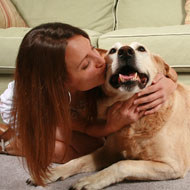
It is well known that wild animals play a vital role in the transmission of disease, however recent research has also shown a link between the domestication of animals and the emergence of new diseases.
Researchers at the University of Liverpool conducted a study into the emergence of zoonotic infections - those that spread between humans and animals.
Findings suggest a positive relationship between the number of parasites and pathogens that humans share with an animal, and the length of time for which the animal has been domesticated.
Using data sourced from existing studies, and information collected from the Liverpool ENHanCEd Infectious Disease (EID2) database, researchers cross-referenced all known cases of parasites and pathogens in domestic animals with the length of time that they have been domesticated.
Domesticated by man for over 17,000 years, dog species were found to share 71 parasites and pathogens with their human companions, compared with 34 in cattle, who have been domestic for 11,000 years.
A "big data" approach to the study was facilitated by a database created by researchers at the Institute of Infection and Global Health. This contained information from over 60 million papers, pieces of electronic reference material and textbooks on the spread and re-emergence of pathogens around the world.
A concept of “centrality” was used to determine which domestic animals were in the middle of the web of shared infections, and most active in the spread of disease to other domestic species.
Epidemiologist Dr Marie McIntyre said: “Using data in this way can help us address the major threat of new diseases and the spread of existing diseases caused by climate change.
“Vast amounts of research are being carried out in this field, yet it isn’t easy to search or draw patterns from it. As with this research into domestic animals, a database can help by bringing huge amounts of evidence together in one place.”



 The Veterinary Medicines Directorate (VMD) is inviting applications from veterinary students to attend a one-week extramural studies (EMS) placement in July 2026.
The Veterinary Medicines Directorate (VMD) is inviting applications from veterinary students to attend a one-week extramural studies (EMS) placement in July 2026.